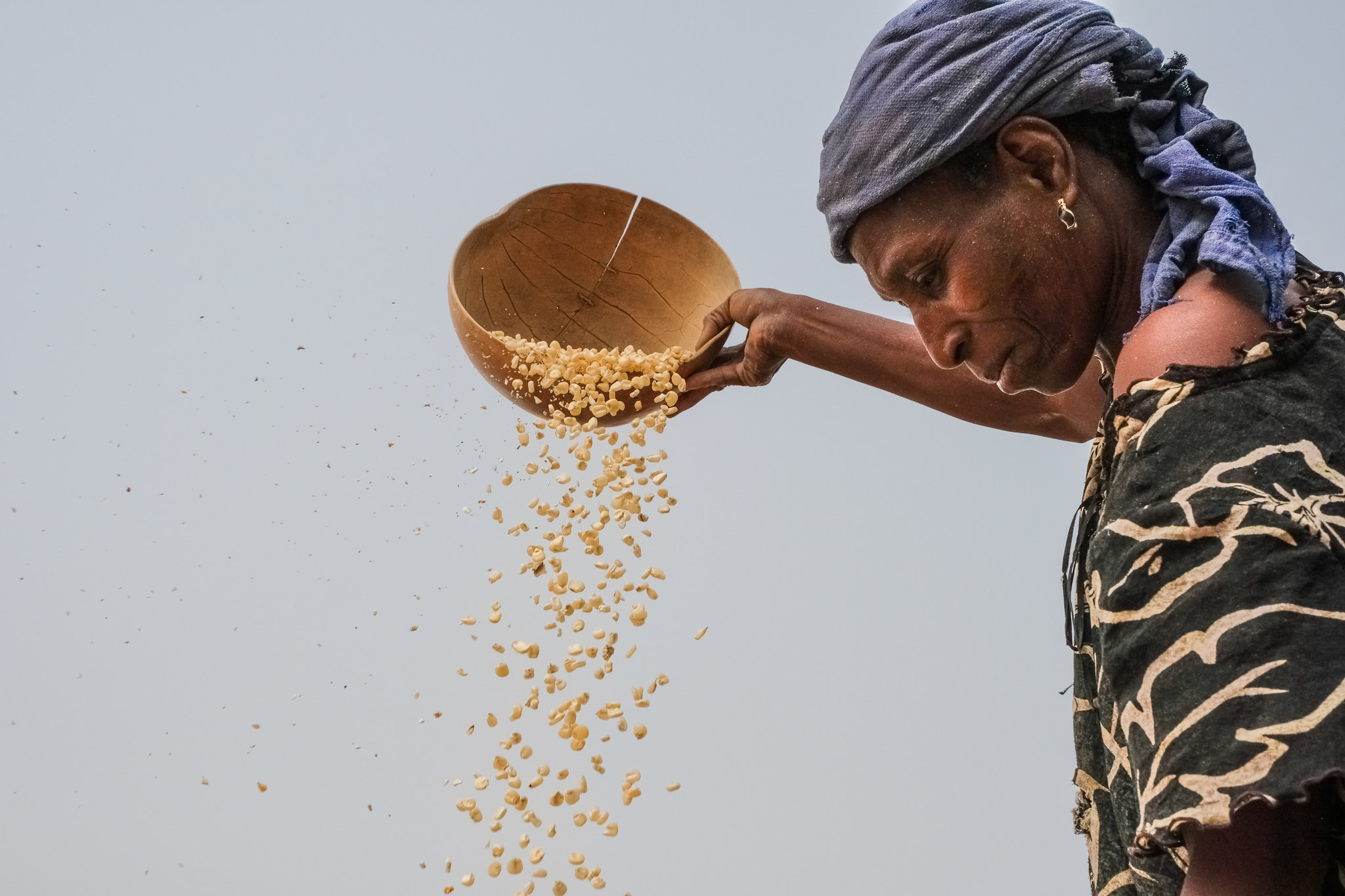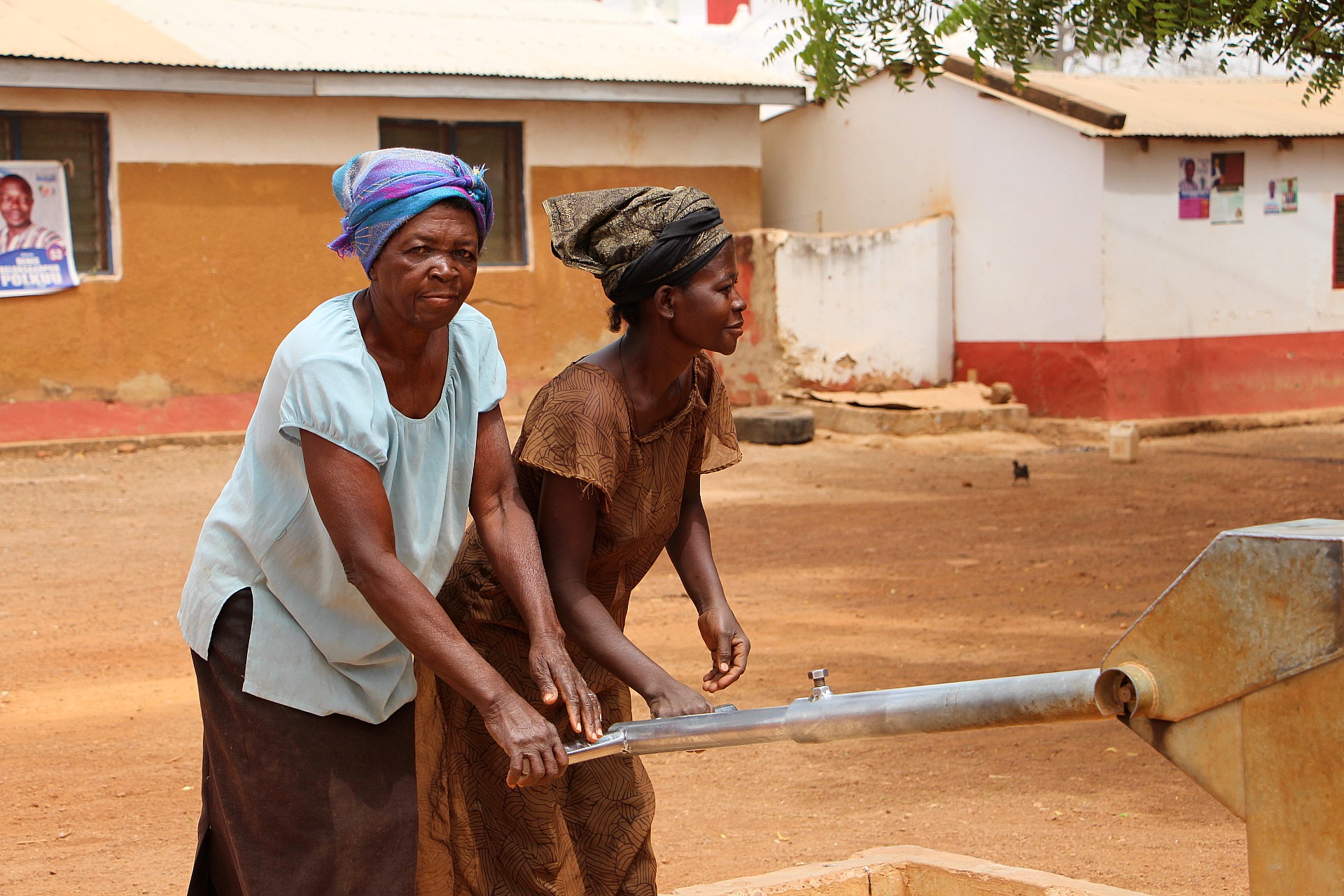Esther Wahabu, Research Officer – Social Sciences, IWMI, Accra, Ghana
Prachi Patel – Migration Communications Consultant, IWMI, USA

(Photo Credit: Axel Fassio/CIFOR)
In northern Ghana’s Upper West Region, climate variability, migration and Covid-19 are transforming the region. Women are adapting by forming farm cooperatives, making, selling and trading goods and taking on additional farming responsibilities traditionally performed by men. In doing so, they are gradually gaining agency over their livelihoods, and ultimately shifting gender roles in their communities.
In Northern Ghana, income and well-being are linked to agriculture. Farmers grow maize, yam, groundnuts, sorghum, rice and other crops, consuming and selling their harvest to maintain food security and bring home an income. But in this semi-arid region, farming is seasonal and growing less lucrative due to climatic variability, with total annual rainfall projected to decline by 20.5% in 2080 in Ghana.
For rural women farmers, these farming challenges can be exacerbated by gender norms. Traditionally, married women do not farm independently of their husbands. Those who do may face challenges, such as limited access to labor and capital.
Mary Lily, a teacher and farmer in the Jirapa district, leads a women’s farmers group, which she started to help smallholder women farmers collectively find solutions to their livelihood challenges. The group promotes access to resources, such as government and NGO service support, as well as financial services.
“Together, we can have access to help from the Ministry of Food and Agriculture (MOFA),” Lily said. “If some NGOs want women groups to work with, the Ministry people call us.” MOFA and NGOs have introduced Lily and fellow rural women farmers to new farming techniques, such as contour farming, which helps them retain water in their fields during limited rainfall. NGOs have offered advice on the best times to cultivate crops, which varieties of crops to use, how to price goods at the market, and introduced farmers to weather forecasts from ESOKO, a mobile platform service providing agricultural data.
Access to credit, skill development and resources facilitated by the women farmers’ group and NGOs are changing attitudes around traditional gender roles in the region.
“Men used to think that women were supposed to be in the kitchen, go fetch water and sweep,” Lily said. “Now that NGOs have come around to educate the women as well as the whole community on gender issues, most men understand and they help women.”
Migration is also shifting gender roles. In the Upper West Region, there is increasing out-migration from rural areas often to cities like Kumasi or Accra, with family members sending money home to support their household. When men migrate, women take on tasks traditionally reserved for men – and vice versa.
“If a man migrates for instance at this time, he probably hasn’t finished all the work in the farm like uprooting of groundnuts and Bambara beans,” said Esther Zury, 24, who farms and sells clothes in Jirapa district. When men leave, the women at home take on farming decisions and responsibilities.
“If the woman also migrates and leaves the children, even if the man doesn’t know how to cook, it becomes necessary for him to cook for the children,” Zury said. “In the past if a man makes a fire and cooks, they will say the woman has cast a spell on her but these days they do it and everyone see it as normal.”
Many women farmers also seek alternative livelihoods during the dry season, engaging in business to bring in additional income. These activities include making soap, trading goods, processing shea butter, brewing pito, a local beer made from millet, or gathering firewood to sell.
For some women, contributing to their family’s finances may increase their ability to make decisions for their household. For instance, Gladys Awiliba, 52, uses her own income from trading to pay for her children’s school fees. “When there is drought or flood and the crops don’t do well,” she said, “I can use the money I make from trading to support.”
Now, restrictions on movement to prevent the spread of the coronavirus have affected local farmers’ access to resources to support farming.
“It has not killed any relative of mine,” said Abena Peter, 40, who lives in Vagoni in Nadowli district with her four children. “But it has brought about poverty.” Peter used to travel to Techiman, a 6-8-hour journey by bus, to purchase raw materials for her business, a trip which is no longer possible due to travel restrictions.

The pandemic may also affect food security in the region. For instance, Ghana experienced a 20% decline in agrifood GDP during its three-week Covid-19 lockdown in Kumasi and Accra. In the Upper West Region, some migrants are returning to their villages because of the pandemic, and fewer agricultural opportunities and more people to feed may affect food security in the region. In response, more women have begun to farm to feed their families. Others have started selling goods, like liquid soap, which has grown in demand in response to the pandemic.
Understanding how climate, migration, gender roles and Covid-19 affect women like Lily, Zury, Awiliba, Peter and their communities can contribute to well-informed policymaking in the Upper West Region. IWMI’s Resilience Against Climate Change – Social Transformation Research and Policy Advocacy (REACH-STR) project, funded by the European Union, seeks to understand these trends and promote social transformation tools to support economic growth in northern Ghana by 2025.
REACH-STR’s work on gender involves understanding gender roles and women’s agency in adaptation to stressors and using findings to develop evidence-based policy recommendations and programming. Informed policies can address constraints, such as limited access to information and capital, as well as support women seeking new livelihoods and greater agency over their income.
International Day of Rural Women on October 15th recognizes the crucial role women and girls play in development. Implementation partners for the REACH-STR project are the University of Ghana – Centre for Migration Studies, University for Development Studies (UDS) and Council for Scientific and Industrial Research (CSIR) – Science and Technology Policy Research Institute.
Thank you to Prosper K. Kayelle, IWMI research assistant, for conducting phone interviews and providing Dagaare to English transcripts for this story.

